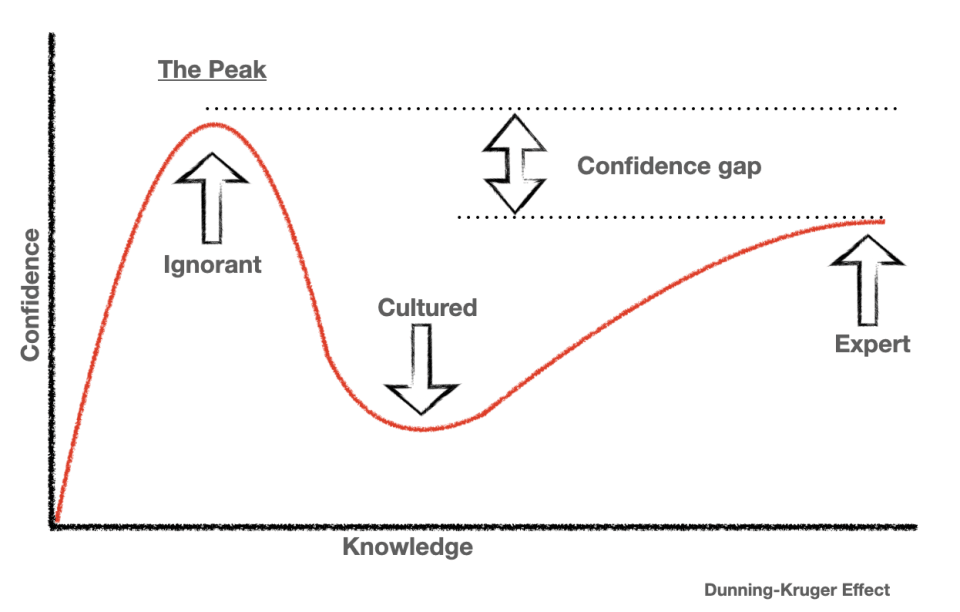The Dunning Kruger Radar
— Dunning-Kruger — 4 min read
I like discussing the Dunning-Kruger effect. I see its impact every day. I see it in myself, my team, peers, managers, political leaders, friends, and family.
In this post, I'm going to explore the effect in the abstract. What is it? Can you be aware of it? Does it matter?
Although this post is, at best, a paradoxical thought experiment, The Dunning-Kruger effect has a profound impact on the world.
And not in a good way.
What is it?
The Dunning-Kruger effect is a cognitive bias in which individuals who lack competence in a particular area overestimate their abilities and believe they are more skilled or knowledgeable than they are. Conversely, those who are highly skilled or knowledgeable may underestimate their abilities due to their assumption that others are similarly competent. In short, it's a phenomenon where incompetence can lead to an overestimation of one's own abilities, and expertise can lead to an underestimation of one's abilities.

The Dunning-Kruger describes the cyclical nature of self-awareness in expertise. This matters as it leads to bad decision-making and perpetuates Imposter Syndrome.
Self-awareness
Self-awareness is one of the most important skills you can have - especially as a leader.
Self-aware people are more humble. They're more likely to seek self-improvement. They're more likely to be open to feedback. They're more likely to be open to new ideas. They're more likely to be open to new ways of doing, thinking and being.
I could write a whole post on the importance of self-awareness. I probably will. However, this post is about self-awareness of expertise. Namely the Dunning-Kruger effect.
Peak Ignorance
I don't know very little about good wine. This makes me vulnerable to "Peak Ignorance".
Picture the scene: you're at a dinner party and you've just been seated next to me. What's the topic of discussion? My newfound expertise in wine. You watch in horror as I pick up my glass of red and swirl it around, making a big show of it. "Ah, yes, I'm getting notes of oak, with a hint of blackcurrant." This is going to be a long night for you.
As the meal progresses, I continue to pontificate about the wine, using phrases like "terroir" and "bouquet" with abandon. You glance around the table, hoping someone will change the subject, but everyone seems to be nodding along, impressed by my supposed knowledge.
You can take it no longer. "Excuse me," you say, interrupting their monologue. "Do you actually know anything about wine, or are you just making it up as you go along?"
I look offended. "Of course, I know about wine," I say. "I went to a wine-tasting evening last week."
I'm sure there's a lot of things to learn about wine tasting. However, when you're a beginner at anything, you don't know what you don't know. That's 2 levels of not knowing.
Peak Ignorance comes in many forms and walks of life. I've succumbed to its allure many times. Some obvious examples include when I:
- read about a new technology and insisted that my team at the time HAD to adopt it.
- bought a combi-drill, watched a youtube video and start drilling holes in my walls.
- criticised football managers for poor team selection or tactics.
- (ashamedly) try and offer opinions on delicate topics such as race, religion and gender.
Can I be aware of it?
Can I be aware of things that I don't know I don't know? It's not easy - there could be a lifetime of expertise you can't imagine.
To to this you'll have to:
know where you are on the Dunning-Kruger curve of... applying yourself to Dunning-Kruger curves.
In other words, be aware of your own self-awareness.
A thought experiment
I like to think I'm pretty self-aware - but maybe that's peak ignorance. Moreover, It'd be highly embarrassing to overestimate my self-awareness. That's like shouting that you don't shout... Or declaring I'm an excelent speller.
But if I acknowledge that I'm at Peak Ignorance, that makes me aware of it. It's a contradiction.
To identify your position on the Dunning Kruger curve, you need to walk along a self-confidence knife edge.
On one side of the knife is Peak Ignorance. On the other: self-doubt and Imposter Syndrome.
Imposter Syndrome
People with imposter syndrome are more likely to underestimate their abilities due to their lack of confidence. This can lead them to downplay their accomplishments and shy away from taking on new challenges.
They are competent, but they don't recognize it because they are comparing themselves to an unrealistic standard of perfection. This can lead to a cycle of self-doubt and negative self-talk, which can be detrimental to their self-esteem and well-being.
Complimentary forces
Worse, Peak Ignorance and Imposter Syndrome are complementary forces - in an entirely negative way. Decisions are more likely to be made by the overly confident "Peak Ignorant" than the self-doubting "Imposters".
While it's the "Imposters" who are more knowledgeable and better placed to make good decisions.
The Dunning Kruger Radar
My best advice is to develop your Dunning-Kruger-radar. Look out for the signs of Peak Ignorance and Imposter Syndrome in others and yourself. Don't judge, just learn.
Do this enough and you'll start to progress up the Dunning-Kruger curve of... applying the Dunning-Kruger curve and identifying your own self-awareness.